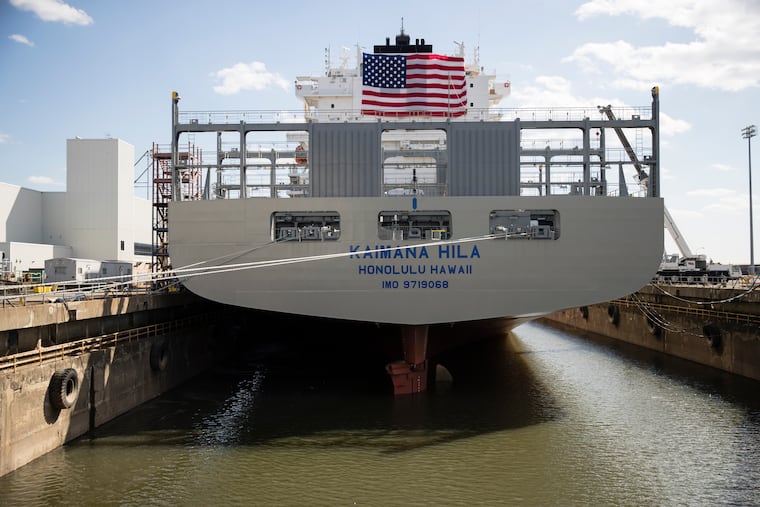The Jones Act is protecting U.S. shipyards to death | Opinion
American shipbuilding can survive and even prosper—so long as the Jones Act isn’t in the way.

Fresh reports have emerged that the Philly Shipyard, the recipient of multiple government bailouts and largesse, is once again on the brink of shutting down. The shipyard’s looming failure isn’t just an indictment of the corporate welfare that has been shoveled in its direction by politicians, but also a little-known, nearly 100-year-old law called the Jones Act.
Passed in 1920, the Jones Act mandates that vessels transporting goods between two points in the United States meet four conditions: They must be U.S.-registered, at least 75 percent U.S.-owned, at least 75 percent U.S.-crewed, and U.S.-built. The logic behind the law was that restrictions on foreign competition would, among other things, encourage the development of a strong U.S. shipbuilding sector.
It hasn’t worked out that way.
Rather than prospering, U.S. shipyards have been in a decline for decades, and there are only a mere handful that build oceangoing commercial ships. That may seem a head-scratcher to some, given the Jones Act’s U.S.-build requirement, but it makes more sense when one considers that these ships cost up to five times more than equivalent vessels built in foreign shipyards.
The most recent vessel christened at the Philly Shipyard, the Kaimana Hila, is a case in point. Built for transporting goods from the West Coast to Hawaii, the ship offers a cargo capacity of 3,600 TEUs (20-foot equivalent units) for the whopping price tag of $209 million. For comparison, the world’s largest container ship, the 21,413-TEU capacity OOCL Hong Kong, was built in South Korea for $158 million. That’s over six times the cargo capacity at a $51 million discount.
Amazingly, despite the Kaimana Hila’s sky-high price, the Philly Shipyard is actually said to have lost money on the deal to build the ship.
Faced with such high prices, shipping companies have delayed replacing their vessels and instead keep them years — and sometimes even decades — past their typical useful life. Expensive ships make for expensive shipping, contributing to a domestic decline in this form of transport in recent decades despite a growing economy. Indeed, Jones Act shipping can be so expensive that ranchers in Hawaii sometimes opt to place their cattle on airplanes for transport to the West Coast instead of ships.
Declining demand, meanwhile, has made it a struggle for U.S. shipbuilders such as the Philly Shipyard to achieve scale or invest in the technology needed to bring their costs down. They’re caught in a vicious cycle that has left them collectively producing for the commercial ship market in a year what Asian yards might churn out in a week.
But it doesn’t have to be like this.
Instead of coddling the Philly Shipyard, it should be forced to compete. And that needs to begin by reforming or repealing the Jones Act to allow Americans to buy foreign-built ships for use in domestic transport. After all, the auto and aerospace industries are not subject to U.S.-build requirements and yet U.S. firms — spurred to innovate by international competition — are world leaders in both.
The experience of European shipyards may provide a useful lesson. As in the United States, European shipbuilders have found themselves increasingly unable to compete on price with Asian yards for the construction of large cargo ships by competitors. But rather than abandoning shipbuilding they have responded by seeking to move up the value chain and focus on higher-end specialized vessels. Tiny Finland, for example, is renowned for its prowess in building icebreakers, while German yards are some of the world’s best at producing cruise ships.
Why should anyone think that Americans, capable of engineering feats ranging from the iPhone to the Dreamliner to rockets that land themselves, can’t find their own segment in this international market? Protectionism has been tried and protectionism has failed. American shipbuilding can survive and even prosper — so long as the Jones Act isn’t in the way.
Colin Grabow is a policy analyst at the Cato Institute’s Herbert A. Stiefel Center for Trade Policy Studies.